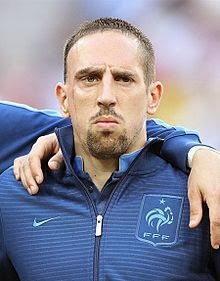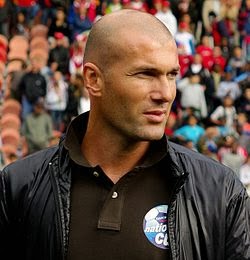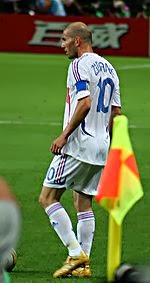Category Zinedine Zidane
Real Madrid wins Champions League
کرسٹیانو رونالڈو : اپنے دور کا بہترین کھلاڑی
‘بڑے میچوں میں وہ ہمیشہ کارکردگی دکھاتا ہے۔ رونالڈو بلاشبہ اپنے دور کا بہترین کھلاڑئ ہے۔’ یہ الفاظ تھے سابق فرانسیسی کپتان اور فٹبال لیجینڈ زینیدین زیدان کے۔ پرتگال اور ریال میڈرڈ کے لیے کھیلنے والے سٹار فٹبالر کرسٹیانو رونالڈو کو لندن میں منعقدہ فیفا ایوارڈز میں رواں سال کا بہترین کھلاڑی قرار دیا گیا ہے۔ رونالڈو نے یہ ایوارڈ ارجنٹینا اور بارسلونا کی نمائندگی کرنے والے سٹار فٹبالر اور حریف لائنل میسی کو شکست دے کر حاصل کیا۔ چاہے وہ فٹبال کے چاہنے والے ہوں یا کھیل پر گہری نظر رکھنے والے ماہرین رونالڈو اور میسی کی بحث ان کے لیے کبھی پرانی نہیں ہوتی۔
مجھے یاد ہے کہ میسی اور رونالڈو سے پہلے بالکل اسی انداز میں فٹبال شائقین زینیدین زیدان اور برازیل کی طرف سے کھیلنے والے سٹار کھلاڑی رونالڈو نزاریو کا موازنہ کرتے تھے۔ شائقین فٹبال میں اوریجینل رونالڈو یا رونالڈو نائن کے نام سے جانے جانے والے نزاریو کا کریئر اپنے عروج پر تھا جب انھیں گھٹنے کی انجری اور ہائپو تھائرائڈ کی بیماری لاحق ہو گئی۔ ماہرین فٹبال آج بھی اسے ’گریٹیسٹ سپورٹنگ ٹریجیڈی‘ یعنی کھیلوں کی دنیا کا سب سے بڑا سانحہ کہہ کر یاد کرتے ہیں۔ اپنے عروج پر رونالڈو نزاریو تقریبًا ہر میچ میں تین سے چار ڈیفینڈروں کے درمیان سے گیند نکال کر لے جاتے ہوئے نظر آتے تھے۔
برازیلین رونالڈو اگر کھیل جاری رکھتے تو وہ کہاں ہوتے اور ان کا مقام کیا ہوتا یہ ایک الگ بحث ہے لیکن یہاں جو بات قابل ذکر ہے وہ یہ ہے کہ اس زمانے میں لوئس فیگو، روبرٹبو کارلوس، مروسلو کلوزے اور راؤل جیسے کھلاڑی بھی موجود تھے۔ لیکن میڈیا اور شائقین کی زیادہ توجہ زیدان اور رونالڈو پر رہتی تھی جیسا کہ آج کے دور میں یہ توجہ کرسچیانو رونالڈو اور لائنل میسی پر مرکوز رہتی ہے۔ رونالڈو نزاریو کا کیریر اپنے عروج پر تھا جب انھیں گھٹنے کی انجری اور ہائپو تھائرائڈ کی بیماری لاحق ہو گئی.
کہتے ہیں کہ تیس کا ہندسہ پار کرنے کے بعد فٹبال کھلاڑی اپنے کیریر کے آخری راؤنڈ میں داخل ہو جاتے ہیں، جہاں ان کے پاس 4 زیادہ سے زیادہ پانچ سال کے عرصہ کا فٹبال رہ جاتا ہے۔ رونالڈو اس وقت بتیس کے ہیں اور میسی 30 کے۔ تو ان دونوں کھلاڑیوں کے بعد کونسے ایسے کھلاڑی ہیں جو کہ ان کی جگہ لے سکتے ہیں۔ حال ہی میں پیرس سینٹ جرمین کو ٹرانسفر ہونے والے 25 سالہ نیمار جونئیر کا شمار دنیا فٹبال کے بہترین ڈربلرز میں سے ہوتا ہے۔
رونالڈہینیو، روبرٹو کارلوس اور رونالڈو نزاریو کے بعد بہت عرصے بعد برازیل کی طرف سے ایک مکمل کھلاڑی سامنے آیا ہے۔ خاص طور پر اس وقت جب فٹبال کا گھر لاطینی امریکہ سے تبدیل ہو کر کے یورپ ہو گیا ہے۔ نیمار نہ صرف جدید فٹبال کو سمجھتے ہیں بلکہ وہ ٹیم پلئیر بھی ہیں۔ بارسلونا کی طرف سے کھیلتے ہوئے نیمار، لوئس سواریز اور لائنل میسی نے شراکت میں تین سیزنز میں تین سو سے زیادہ گول کیے ۔
دوسرے نمبر پر ہیں چھبیس سالہ فرنچ کھلاڑی انٹوان گریزمن۔ ہسپانوی کلب ایتھلیٹکو میڈریڈ کی طرف سے کھیلنے والے گریزمن گزشتہ سیزن میں گولز کی تعداد ٹیبل پر رونالڈو اور میسی کے بعد تیسرے نمبر پر تھے۔ تیسرے نمبر پر ہیں انگلش کھلاڑی ہیری کین۔ چاہے وہ مڈفیلڈ سے تھرو پاس ہو یا پھر ونگر کی طرف سے بھیجا گیا کراس، ہیری کین اسے پلک چھپکتے گول میں تبدیل کر دیتے ہیں۔ ٹاٹنہم ہاٹ سپرز کی طرف سے فارورڈ کی پوزیشن پر کھیلنے والے ہیری کین کو ‘ڈیڈلیئسٹ فنشرر آف دی گیم’ کہا جا رہا ہے۔ انھوں نے پچھلے گیارہ میچوں میں پندرہ گول سکور کیے ہیں۔ چوتھے نمبر پر ہیں 18 سالہ کائلن ایمباپے۔ فرانس کی قومی ٹیم اور پی ایس جی کی طرف سے فارورڈ پوزیشن پر کھیلنے والے ایمباپے نے گزشتہ سیزن میں موناکو کی طرف سے کھیلتے ہوئے پندرہ گول کیے تھے۔
غضنفر حیدر
بی بی سی اردو ڈاٹ کام، لندن
Zinedine Zidane : New Coach of Real Madrid
Samir Nasri
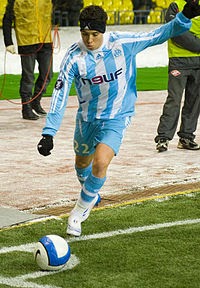 Samir Nasri (born 26 June 1987) is a French international footballer who plays for English club Manchester City in the Premier League and the France national team. He primarily plays as an attacking midfielder and a winger, although he has also been deployed in central midfield. Nasri is known for his technical ability, creativity, pace, and ability to read the game.[3][4] Of Algerian heritage, he is described as a player whose “vision and imagination make him an unpredictable opponent”.[5] His playing style, ability, and cultural background have drawn comparisons to French legend Zinedine Zidane.[6][7]
Samir Nasri (born 26 June 1987) is a French international footballer who plays for English club Manchester City in the Premier League and the France national team. He primarily plays as an attacking midfielder and a winger, although he has also been deployed in central midfield. Nasri is known for his technical ability, creativity, pace, and ability to read the game.[3][4] Of Algerian heritage, he is described as a player whose “vision and imagination make him an unpredictable opponent”.[5] His playing style, ability, and cultural background have drawn comparisons to French legend Zinedine Zidane.[6][7]Personal life
Club career
Early career
Marseille
Debut season
Mssut Ozil
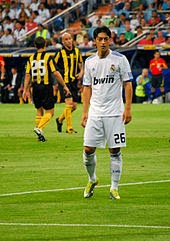 Mesut Özil born 15 October 1988) is a German footballer who plays for Premier League club Arsenal and the German national team. Özil has been a youth national team member since 2006, and a member of the German national team since 2009. He gained international attention during the 2010 FIFA World Cup and was nominated for the Golden Ball Award, which is awarded to the tournament’s best player. Özil started his senior career at hometown club Schalke in the Bundesliga in 2006, transferred to Werder Bremen in 2008 and transferred to Real Madrid in August 2010 following his breakout performance at the FIFA World Cup with Germany. On transfer deadline day of summer 2013, he moved to Arsenal in a club record of £42.5 million.[4][5][6][7]The transfer makes him the most expensive German football player of all time.
Mesut Özil born 15 October 1988) is a German footballer who plays for Premier League club Arsenal and the German national team. Özil has been a youth national team member since 2006, and a member of the German national team since 2009. He gained international attention during the 2010 FIFA World Cup and was nominated for the Golden Ball Award, which is awarded to the tournament’s best player. Özil started his senior career at hometown club Schalke in the Bundesliga in 2006, transferred to Werder Bremen in 2008 and transferred to Real Madrid in August 2010 following his breakout performance at the FIFA World Cup with Germany. On transfer deadline day of summer 2013, he moved to Arsenal in a club record of £42.5 million.[4][5][6][7]The transfer makes him the most expensive German football player of all time.Gelsenkirchen and Rot-Weiss Essen
Schalke 04
Werder Bremen
Real Madrid
2010–11 season
2011–12 season
2012–13 season
Arsenal
2013–14 season
Franck Ribéry
 Franck Ribéry (born 7 April 1983) is a French international footballer who plays for German club Bayern Munich in the Bundesliga and for the France national team. He primarily plays as a winger, preferably on the left side although being right-footed, and is known for pace, energy, skill and precise passing.[2] Ribéry is described as a player who is fast, tricky and an excellent dribbler, who has great control with the ball at his feet.[3] Since joining Bayern, he has been recognised on the world stage as one of the best French players of his generation. The previous talisman of the French national team, Zinedine Zidane, has called Ribéry the “jewel of French football”.[4]
Franck Ribéry (born 7 April 1983) is a French international footballer who plays for German club Bayern Munich in the Bundesliga and for the France national team. He primarily plays as a winger, preferably on the left side although being right-footed, and is known for pace, energy, skill and precise passing.[2] Ribéry is described as a player who is fast, tricky and an excellent dribbler, who has great control with the ball at his feet.[3] Since joining Bayern, he has been recognised on the world stage as one of the best French players of his generation. The previous talisman of the French national team, Zinedine Zidane, has called Ribéry the “jewel of French football”.[4]Personal life
Alleged prostitute scandal
Club career
Early career
Galatasaray
Zinedine Zidane
Early life and career
 It was in La Castellane that Zidane had his earliest introduction to football, joining in at the age of five in football games that the neighbourhood’s children played on the Place Tartane, an 80-by-12-yard plaza that served as the main square of the housing complex.[13] In July 2011, Zidane named former Olympique Marseille players Blaž Slišković, Enzo Francescoli and Jean-Pierre Papin as his idols while growing up.[14][15]At the age of ten, Zidane got his first player’s license after joining the junior team of a local club from La Castellane by the name of US Saint-Henri. After spending a year and a half at US Saint-Henri, Zidane joined SO Septèmes-les-Vallons when the Septèmes coach Robert Centenero convinced the club’s Director to get Zidane. Zidane stayed with Septèmes until the age of fourteen, at which time he was selected to attend a three-day training camp at the CREPS (Regional Centre for Sports and Physical Education) in Aix-en-Provence, one of several such footballing institutes run by the French Football Federation. It was here that Zidane was spotted by AS Cannes scout, and former player, Jean Varraud who recommended him to the training center director of the club.[16]
It was in La Castellane that Zidane had his earliest introduction to football, joining in at the age of five in football games that the neighbourhood’s children played on the Place Tartane, an 80-by-12-yard plaza that served as the main square of the housing complex.[13] In July 2011, Zidane named former Olympique Marseille players Blaž Slišković, Enzo Francescoli and Jean-Pierre Papin as his idols while growing up.[14][15]At the age of ten, Zidane got his first player’s license after joining the junior team of a local club from La Castellane by the name of US Saint-Henri. After spending a year and a half at US Saint-Henri, Zidane joined SO Septèmes-les-Vallons when the Septèmes coach Robert Centenero convinced the club’s Director to get Zidane. Zidane stayed with Septèmes until the age of fourteen, at which time he was selected to attend a three-day training camp at the CREPS (Regional Centre for Sports and Physical Education) in Aix-en-Provence, one of several such footballing institutes run by the French Football Federation. It was here that Zidane was spotted by AS Cannes scout, and former player, Jean Varraud who recommended him to the training center director of the club.[16]


























